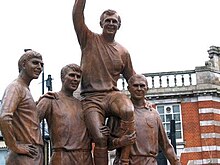Geoff Hurst
| Geoff Hurst | ||
 Geoff Hurst (2008)
|
||
| Personnel | ||
|---|---|---|
| Surname | Sir Geoffrey Charles Hurst | |
| birthday | December 8, 1941 | |
| place of birth | Ashton-under-Lyne , England | |
| size | 181 cm | |
| position | striker | |
| Men's | ||
| Years | station | Games (goals) 1 |
| 1959-1972 | West Ham United | 411 (180) |
| 1972-1975 | Stoke City | 108 (30) |
| 1975-1976 | West Bromwich Albion | 10 (2) |
| 1976 | Seattle Sounders | 24 (9) |
| 1976 | Cork Celtic | 9 (3) |
| National team | ||
| Years | selection | Games (goals) |
| 1966-1972 | England | 49 (24) |
| Stations as a trainer | ||
| Years | station | |
| 1976-1979 | Telford United | |
| 1979-1981 | Chelsea FC | |
| 1 Only league games are given. | ||
Sir Geoffrey Charles Hurst [ ˈdʒɛfɹi ], called Geoff Hurst [ dʒɛf ], (born December 8, 1941 in Ashton-under-Lyne near Manchester , Lancashire ) is a former English football player . The 1966 world champion went down in the history of his sport as the goal scorer of the so-called Wembley goal . In this final he scored two more goals, making him the only hat-trick scorer in a World Cup final .
career

During his playing days, Geoff Hurst played for West Ham United , Stoke City and West Bromwich Albion . With West Ham he won the FA Cup in 1964 , where he contributed a goal to the 3-2 final win over Preston North End . The following year he reached the final of the European Cup Winners' Cup with West Ham , which was won 2-0 against TSV 1860 Munich .
He played his first international game on February 23, 1966 in a 1-0 win in a friendly against Germany . He scored his first international goal in his second international match on April 2, 1966: In a 4-3 win over Scotland in Glasgow in the British Home Championship , he made it 1-0. With this win in the last game, England won the championship.
He played a total of 49 international matches for England and scored 24 goals. In 1966 and 1970 he took part in two football world championships for England .
The high point of his career was winning the 1966 World Cup with the English national team. In the group games he has not yet been used. It was only when Jimmy Greaves was injured in the last group game against France that Hurst joined the team for the quarter-finals against Argentina and scored the 1-0 winner. He then kept his place in the team although Greaves, at the time with 43 goals English record scorer, was again operational for the final. Hurst scored three goals in the 4-2 win in the final against Germany, including the controversial 3-2. This goal went down in sports history as the so-called Wembley goal . Hurst always took the view that it was a goal - not because he saw it that way, but because his team-mate Roger Hunt immediately began to cheer. He is the only player to date to have scored three goals in a World Cup final. With a total of four goals, he was, along with three other players, including Franz Beckenbauer , the third top scorer of the tournament .
In 1968 he took part with England for the first time in the European Championship finals, but was only used in the game for third place against the Soviet Union , where he contributed a goal to the 2-0 victory.
At the 1970 World Cup he was used in two group games and the quarter-finals against Germany. He scored the 1-0 winner in the first game against Romania and thus his fifth World Cup goal. This makes him the second best World Cup goalscorer for England after Gary Lineker (10 goals).
He played his last international game on April 29, 1972 in the 1: 3 home defeat in the quarter-finals of the European Championship 1972 against Germany, where he was the only player in the game to be substituted after an hour when the score was 0: 1.
From 1979 to 1981 he coached Chelsea FC and then worked in the insurance industry. In 2002, Hurst retired. He has since given lectures and is involved in a charity project.
Private
Hurst lives in Weybridge with his wife Judith, whom he met in 1960 and married in 1964 . The couple have three daughters, the oldest of whom died of a brain tumor in 2010.
In 1998 he was ennobled by Queen Elizabeth II .
successes
- World Champion: 1966
- European Cup Winner: 1965
- FA Cup winner: 1964
- Charity Shield Winner: 1964 (shared)
Individual evidence
- ^ Scotland - England 3: 4
- ^ England - West Germany 1: 3
- ↑ a b star no. 22/2013 p. 146
Web links
- 'Geoff' Hurst's A internationals and goals (English)
- Profile at Planet World Cup (English)
- Players statistics in the Post War English & Scottish Football League A - Z Player's Database (English)
- Geoff Hurst in the soccerbase.com database
- Geoff Hurst in the database of weltfussball.de
| personal data | |
|---|---|
| SURNAME | Hurst, Geoff |
| ALTERNATIVE NAMES | Hurst, Geoffrey Charles (full name) |
| BRIEF DESCRIPTION | English soccer player |
| DATE OF BIRTH | December 8, 1941 |
| PLACE OF BIRTH | Ashton-under-Lyne |
